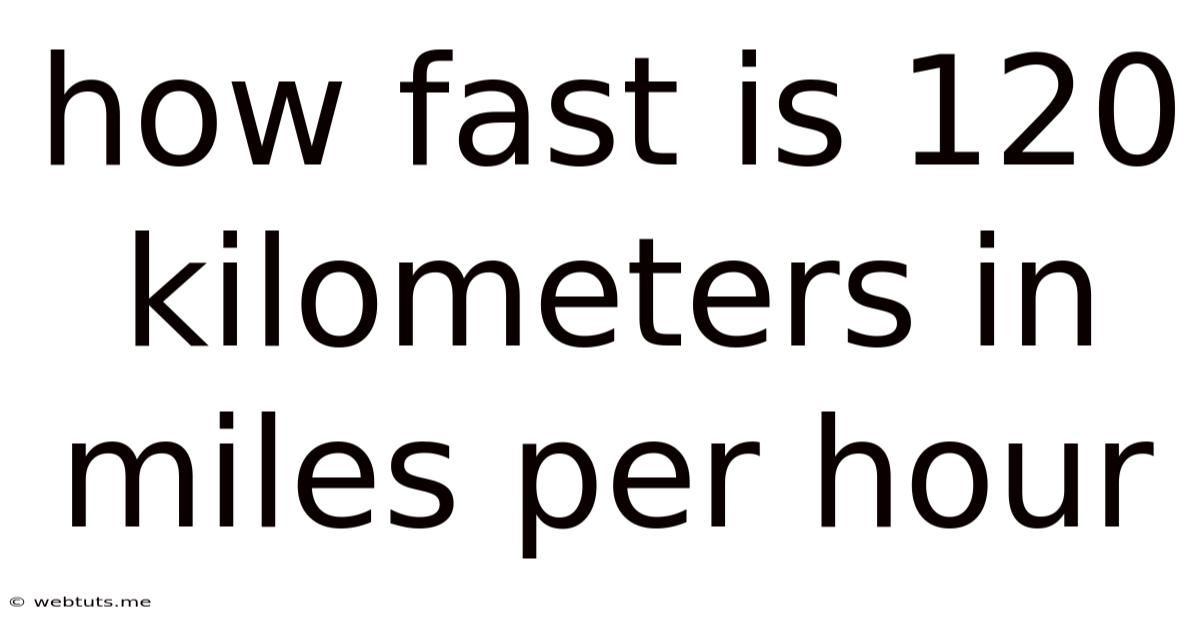How Fast Is 120 Kilometers In Miles Per Hour
Webtuts
May 11, 2025 · 4 min read

Table of Contents
How Fast Is 120 Kilometers in Miles Per Hour? A Comprehensive Guide to Speed Conversions
Knowing how to convert units of measurement is a crucial skill, particularly when traveling or working with international data. This comprehensive guide will delve into the conversion of 120 kilometers to miles per hour (mph), explore the practical applications of this conversion, and provide you with the tools to perform similar conversions independently. We'll also touch upon the importance of understanding speed in various contexts and the broader implications of unit conversions.
Understanding the Fundamentals: Kilometers and Miles
Before diving into the conversion, let's understand the units involved. Kilometers (km) and miles (mi) are both units of distance, but they're based on different systems of measurement.
- Kilometers: Part of the metric system, primarily used in most countries globally. One kilometer is equal to 1000 meters.
- Miles: Part of the imperial system, predominantly used in the United States and a few other countries. One mile is equal to 5280 feet.
The key difference lies in their scale: a mile is significantly longer than a kilometer. This difference is why accurate conversion is essential to avoid misunderstandings, particularly when dealing with speed and distance.
Converting 120 Kilometers to Miles: The Calculation
The conversion itself is straightforward, albeit requiring a constant conversion factor. One kilometer is approximately equal to 0.621371 miles. Therefore, to convert 120 kilometers to miles, we use the following calculation:
120 km * 0.621371 mi/km ≈ 74.56 miles
Therefore, 120 kilometers is approximately equal to 74.56 miles. However, this only represents distance. To convert to speed (miles per hour), we need additional information.
The Missing Piece: Time
The conversion above only deals with distance. To express 120 kilometers as a speed in miles per hour, we need to know the time taken to cover that distance. For example:
-
Scenario 1: Traveling 120 kilometers in 2 hours. In this case, the speed is 120 km / 2 hours = 60 km/h. Converting this to mph, we get 60 km/h * 0.621371 mi/km ≈ 37.3 mph.
-
Scenario 2: Traveling 120 kilometers in 1 hour. The speed is 120 km/h. Converting to mph, we get 120 km/h * 0.621371 mi/km ≈ 74.6 mph.
This illustrates the critical role of time in determining speed. 120 kilometers is not inherently a speed; it's a distance. The speed depends entirely on the time taken to cover that distance.
Practical Applications of Speed Conversions
Understanding speed conversions is crucial in various real-world scenarios:
-
International Travel: When renting a car or planning a road trip, understanding speed limits in different countries (often displayed in kilometers per hour) is vital for safe driving.
-
Aviation: Aircraft speeds are frequently expressed in knots (nautical miles per hour), requiring conversion to understand their speed in standard units like mph or km/h.
-
Shipping and Logistics: Tracking shipments and calculating delivery times often involves converting between different units of distance and speed.
-
Sports: Many sports, such as racing, involve speeds measured in different units, requiring conversion for accurate comparisons.
-
Scientific Research: In fields like physics and engineering, accurate unit conversions are paramount for data analysis and research.
Beyond the Basics: Advanced Conversion Techniques
While simple multiplication provides a basic conversion, more sophisticated methods exist for increased accuracy:
-
Using Online Converters: Numerous online tools provide accurate and instant conversions between various units, including kilometers and miles. These tools often offer greater precision than manual calculations.
-
Programming Languages: Programming languages like Python or Java have built-in functions or libraries for performing unit conversions, offering automated and accurate calculations for large datasets.
-
Dimensional Analysis: This powerful technique uses the units themselves to guide the conversion process, ensuring that the final result has the correct units.
The Importance of Accuracy in Speed Conversions
Inaccurate conversions can have serious consequences:
-
Safety Hazards: Misinterpreting speed limits can lead to accidents. Inaccurate calculations in aviation or shipping can have devastating consequences.
-
Financial Implications: Incorrect calculations in logistics or shipping can lead to delays, increased costs, and lost revenue.
-
Scientific Errors: Inaccurate conversions in scientific research can invalidate results and lead to flawed conclusions.
Mastering Unit Conversions: A Skill for the Future
The ability to convert units of measurement is a fundamental skill with widespread applications across numerous fields. While the conversion from kilometers to miles is relatively straightforward, understanding the underlying principles and potential pitfalls ensures accurate and safe application in various contexts. Mastering these techniques empowers you to work confidently with international data, navigate diverse systems of measurement, and avoid potentially serious errors. Whether you're traveling abroad, working in international trade, or pursuing scientific research, the ability to accurately convert units of speed is a valuable asset.
Latest Posts
Latest Posts
-
30 Days From October 4 2024
May 12, 2025
-
How Many Days Till June 7 2025
May 12, 2025
-
Cuanto Es 79 Kilos En Libras
May 12, 2025
-
How Many Pounds In 10 Liters
May 12, 2025
-
How Much Landscape Stone I Need For 300 Square Feet
May 12, 2025
Related Post
Thank you for visiting our website which covers about How Fast Is 120 Kilometers In Miles Per Hour . We hope the information provided has been useful to you. Feel free to contact us if you have any questions or need further assistance. See you next time and don't miss to bookmark.